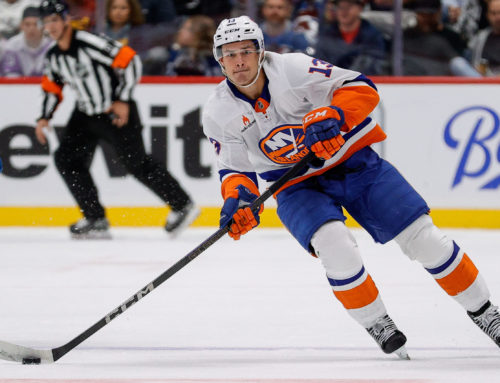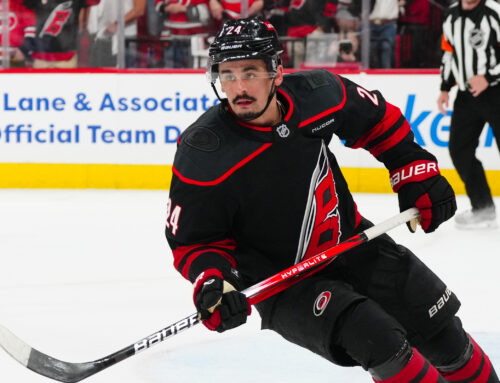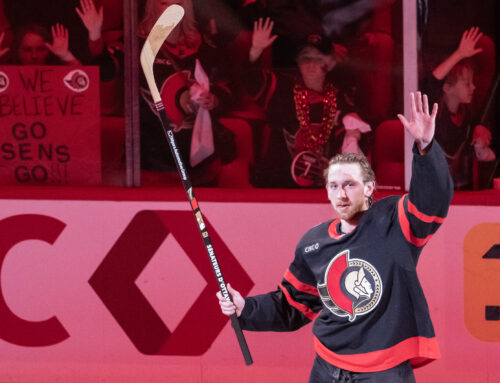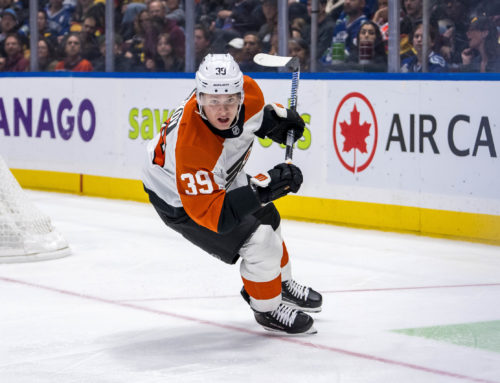
Whoever says you can’t buy happiness obviously isn’t familiar with Dobber’s Ultimate Fantasy Pack. The 2019 edition includes prospect reports, playoff and regular season draft lists, sleeper picks, point projections and so much more! The fantasy guides are so useful when you’re assessing the values of players in a trade or debating whether or not to swap a member of your roster for a free agent on the waiver wire. I want you to close your eyes and imagine all the problems in your life being solved for the small price of $29.99. Now open your eyes and imagine no longer! Click here to head on over to the shop and improve your life in a couple of clicks.
****
What do Ice Ice Baby, Come on Eileen, Take on Me, Never Gonna Give You Up and Bad Day have in common? They’re all one-hit wonders! What do Jeff Skinner, Mike Hoffman, Cam Atkinson and Teuvo Teravainen have in common? None of them are one-hit wonders! This week we’ll take a look at a few players coming off career seasons who aren’t expected to match the same level of production going forward. Most fantasy managers will be avoiding the following players in fear of regression, but I urge you to take a chance on them if they fall to you on draft day.
SkInNeR iS NevEr GoINg tO SCorE 40 GoALs AgAiN. I’ve seen this view expressed several times on social media as a lot of people are underestimating Skinner’s fantasy value for the 2019-2020 campaign. To be fair, his production did fall off a cliff in the final quarter of last season where he tallied just eight points in 21 games. While Skinner’s 14.9 shooting percentage last year was higher than anything we’ve seen from him previously, he’s certainly capable of scoring on around 12 to 13-percent of his shots – which should still be good enough for 35 goals going forward. In some respects, it’s unfair to compare Skinner’s performance last season to the rest of his career because Jack Eichel is so much better than anyone he played with in Carolina. Twenty-two-year-old Eichel is going to keep getting better, which is good news if you own Skinner in your fantasy league.
The Eichel-Skinner duo outscored opponents by a score of 53-43 through almost 850 minutes of ice-time. They controlled 53-percent of scoring chances created while they were on the ice and over 56-percent of total high danger opportunities (Natural Stat Trick). Buffalo has bolstered their depth scoring through the additions of Jimmy Vesey and Marcus Johansson, which should take some pressure off of Skinner, Eichel and Sam Reinhart, who used to be the only real threatening line.
In terms of defesne, Rasmus Dahlin has a year of experience under his belt and the acquisitions of Colin Miller and Henri Jokiharju strengthen the right side (although the blueline is getting a bit crowded and someone is probably going to be shipped out). Overall, Buffalo is trending in the right direction, so I have faith that Jeff Skinner can achieve the same level of production we saw from him last year. If not 40 goals and 63 points, maybe 35 goals and 65 points?
If I told you your performance at work over the next year would determine your salary for the next few years, you’d probably work your but off for the 12 months. The same is true for Hoffman, who’s in the final year of his contract and will need a strong season to earn a substantial raise on his next deal. Hoffman put up a career-high 70 points in 82 games last season, but this didn’t come out of nowhere as he put up a similar pace during the 2016-2017 campaign when he tallied 60 points in 72 games.
I think the most notable thing about Hoffman’s production last year is how many points he scored on the power play. Exactly half of his 70 points were scored with the man-advantage, and only Nikita Kucherov, Steven Stamkos, Keith Yandle, Nathan MacKinnon and Phil Kessel had more than Hoffman’s 35 power-play points. It seems that Hoffman’s offensive numbers were strengthened by a strong Panthers’ power play, which capitalized on 26.8-percent of their opportunities – second to only the Tampa Bay Lightning. Don’t get me wrong, Florida certainly has the talent to maintain one of the league’s most efficient PP units, but I wouldn’t be surprised if they scored a little less next year.
In short, Hoffman is capable of replicating his offensive output from last season, but his recent reliance on power play production is a reason to be cautious when you draft him.
I’d be a fool to say that Artemi Panarin’s departure isn’t going to affect Cam Atkinson’s production, but I’m not convinced it’s going to make as big a difference as many people think. Let’s take a look at the line stats first, which I’ll admit are quite damning…
Last season, the trio of Panarin, Atkinson and Pierre-Luc Dubois outscored their opponents 50-38 through 750 minutes of ice-time. They also managed to control a greater portion of the shot-share than their opponents (55-percent CorsiForPercentage), while controlling 57-percent of the scoring chances and almost 56-percent of the high-danger opportunities (Natural Stat Trick). To make a long story short, the top line played really well together. In contrast, Atkinson and Dubois struggled when Panarin was replaced with another forward. In 150 minutes of ice-time without Panarin, Atkinson and Dubois were outscored 6-8, they controlled just 36-percent of the shot-share and 40-percent of scoring chances. Essentially, they were thoroughly outplayed by the opposition when Panarin wasn’t on the ice with them. I guess this means Atkinson’s fantasy value plummets during the 2019-2020 season, right? Well, I don’t think it’s quite that simple.
A lot of people forget that Atkinson scored 35 goals and 62 points during the 2016-2017 campaign – before Panarin arrived in Columbus. The reality is, Atkinson’s supporting cast now is better than it was a couple of seasons ago. I’d take an underrated Gustav Nyquist and Pierre-Luc Dubois – who is constantly improving – over a plethora of 50-point payers that included Alexander Wennberg, Brandon Saad, Nick Foligno and Sam Gagner. However, it is important to note that Atkinson’s production in 2016-2017 was strengthened by a career-high 21 power-play points as the team converted on 19.9-percent of their opportunities. Their PP-unit has been much less impressive in recent seasons, scoring on just 17.2-percent (2017-2018) and 15.4-percent (2018-2019) of their chances.
In short, Atkinson is capable of registering another 60-point season in Panarin’s absence, but he’s going to need the team’s power-play to improve.
The 24-year-old is still young enough for us to consider his career-high 76-point season as a sign on things to come rather than an outlier. I’m most encouraged by Teravainen’s production because it wasn’t a result of an inflated shooting percentage or dependence on teammates.
It surprises me just as much as it surprises you, but Teuvo Teravainen’s production doesn’t depend on Sebastian Aho as much as we would think. To give you some context, Teravainen tallied 21 points in the final 20 games of last season and spent the majority of that time playing with guys like Jordan Staal, Andrei Svechnikov, and Micheal Ferland. In fact, he only played with Aho for about 16 minutes during the entirety of that 20-game stretch as Aho was primarily playing with Justin Williams and Nino Niederreiter.
It’s hard to predict exactly where Teravainen will play next season because the newly-acquired Ryan Dzingel and Erik Haula have to be integrated into the lineup. In addition, Justin Williams hasn’t yet made his made a decision on his future and could also be back in the lineup for the start of next season. While it appears likely that Teravainen plays with Aho next season – with either Niederreiter or Svechnikov rounding out the line – I think Teravainen is capable of another 70-point season even if he’s separated from Aho.





 FLA
FLA EDM
EDM MIN
MIN BUF
BUF NYR
NYR CHI
CHI OTT
OTT L.A
L.A UTA
UTA MTL
MTL
